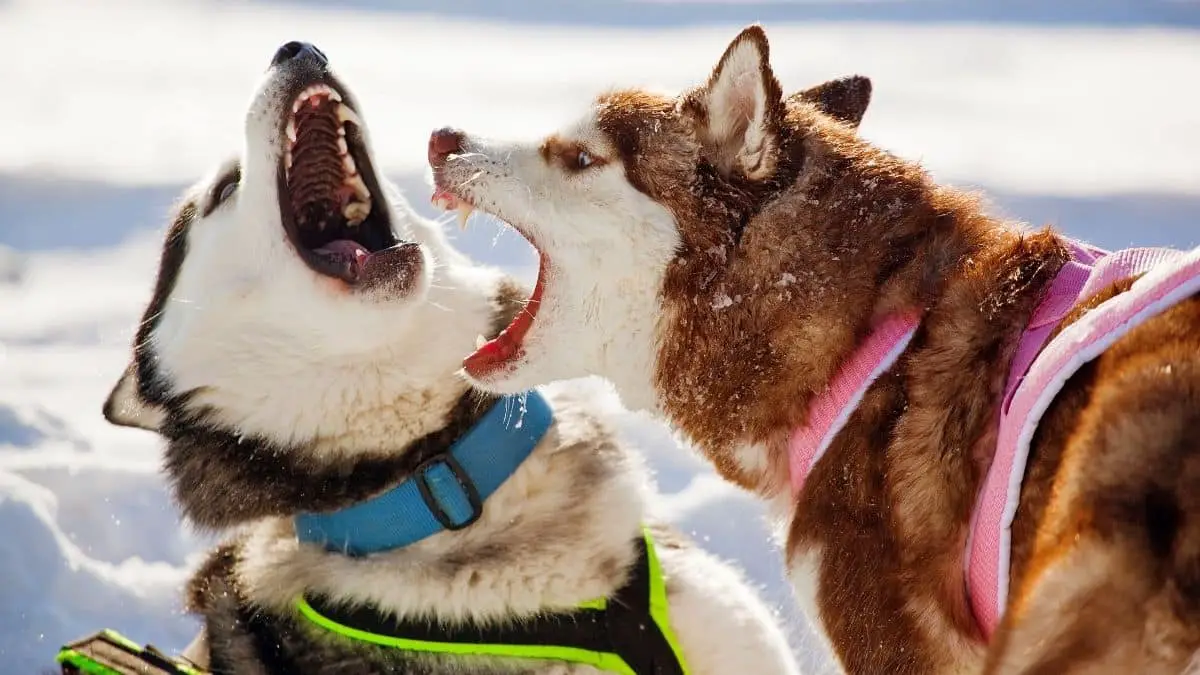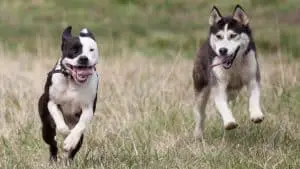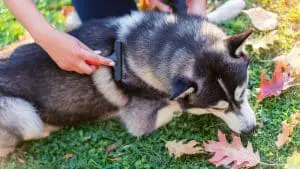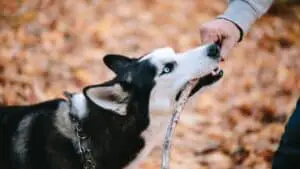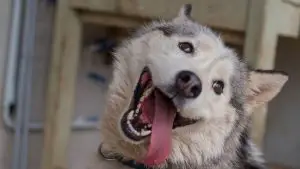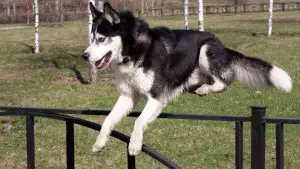Husky Aggression Problems: Training Tips & Background
Known for their distinctive wolf-like appearance and relatively large size, Siberian Huskies might sometimes be thought of as aggressive or dangerous dogs. When it comes to choosing the right animal for your family pet, understanding the temperaments and characteristics of the animal that you intend to bring into your house is critical.
Aggression is one of the biggest problems in dogs. However, it is not a common trait in this particular breed. Siberian Huskies are among the least aggressive dogs, and you will rarely experience aggression or antisocial behavior from your beloved Husky dog. Due to their friendly nature (they even love strangers) Siberian Huskies number among the least likely breeds to attack anyone. For this reason, they can make a great family pet. A Siberian Husky is usually free-spirited and good-natured with everyone.
With that in mind, it is important to note that any dog may become aggressive and bad-tempered if they are not socialized correctly or if they are ill-treated. The people around your dog will be instrumental in the long term good behavior and mental health of your pooch, so ensuring that your dog is brought up in a well-trained, positive manner will go a long way to ensuring he is well behaved in the long term.
Table of Contents
The Big Problem with Huskies
When it occurs, Siberian Husky aggression is not only inappropriate but it is also not safe. As a rule, any aggressive dog cannot be trusted, especially with children, and the same goes for Siberian Huskies, which are normally great with children.
A dog with aggression issues can be very unpredictable, and you can never know when he will strike or lash out. The aggression can reach a point where you are afraid of your own dog and do not even want to be around him lest he strikes unexpectedly.
When a Siberian Husky has aggression problems, you may notice that one minute the dog will be playful and very fun to be around, but the next minute he could be snapping and growling. These mood changes could be perhaps due to a trigger that you may not be aware of; in some situations, you may even cause the trigger without knowing.
Causes of the aggression
Causes of Siberian Husky aggression could range from dominance related issues or a trigger from the past. These past triggers could include cruel behavior from previous owners, or even be the result of an attack by another dog. If you have adopted your Husky from a shelter, the likelihood of a past traumatic event of this nature can be quite high.
In short, the reasons for your Husky’s aggressive behavior can be diverse. Whatever the cause, the aggression and the behavior that goes along with it must be dealt with as soon as the signs show up. Aggressive behavior is never to be tolerated, even for a moment. If you overlook the early signs of aggression and let it prolong, the dog may become dangerous.
When you have an aggressive dog, you should never challenge him. It could provoke an attack. It may be advisable not to engage in rough games with the dog, such as wrestling or tug-of-war. Engage in games that do not involve competition for dominance.
Just as you would with children that were exhibiting problematic behaviors when your Siberian Husky displays aggression it is important to ascertain the root cause of the aggression. To do this, you must watch your Siberian Husky very closely.
Siberian huskies communicate what is on their mind by body language. You may notice that he makes himself as large as possible, ears pointed out and chest out. These are some of the physical traits they use to assert dominance and show they are in charge.
Look out for these physical signs, and when you notice them, you must take action immediately. The aggression is just around the corner. Make it clear that he does not have the dominant role in your family.
Obedience classes may come in handy in establishing dominance over the dog. The best way to treat aggression is by eliminating the cause. That is why it is important to establish the root cause first. Suppose you cannot quite put the finger on the cause of the aggression or have no idea how to go about dealing with the Siberian Husky aggression. In that case, it may be necessary to employ a professional’s services.
Frequently Asked Questions
Are Siberian Huskies aggressive dogs?
According to the American Kennel Club, Siberian Huskies are known for being loyal, mischievous, and outgoing. So, while your Siberian Husky may be cheeky, it is not within his natural behavior to be aggressive.
In fact, Siberian Huskies have a reputation as terrible guard dogs! Instead of seeing most strangers as a threat, they will instead welcome them with boisterous behavior and a friendly demeanor.
With this in mind, however, it is important to note that any animal will start to demonstrate aggressive behavior if sufficiently provoked or abused. This behavior in dogs – aggression in connection with ill-treatment – is well documented. If you are a responsible, kind owner, then you will likely live a very long and happy life with your very happy Husky!
Why do Siberian Huskies get aggressive?
If your Husky has not been socialized with other dogs from a young age, he may perceive other dogs as a threat when he is eventually exposed to them. This behavior relates to your Husky’s perception of himself as the dominant player in his world and any situations which threaten that perception – including first-time exposure to other animals – can result in an aggressive response.
Similarly, if your Husky has experienced abuse or poor treatment at the hands of cruel or irresponsible owners previously, he may have some aggressive tendencies that he has developed as a defense mechanism. If this is the case, it may be helpful to seek the assistance and guidance of a professional trainer, experienced in dealing with aggression in dogs.
How do you deal with an aggressive Husky?
If you have noticed that your Husky has started to develop some aggressive tendencies, it is important that you work with him to overcome them. Take note of when your Husky starts to display these behaviors, and attempt to keep your dog away from these triggering situations.
If it is impossible to completely remove your pup from the circumstances that bring out the worst in him, try and overcome his instinct to be aggressive through positive reinforcement. When your Husky starts acting aggressively, use a low, firm ‘no’, along with his name. Wait until your Husky calms down, then reward him.
It may be that your Husky is scared when he acts aggressively. In this case, he will look to you for guidance and assurance. You should keep a calm and positive demeanor in these situations, thereby assuring your Husky that everything is okay and that he doesn’t need to act out.
How do you discipline a Siberian Husky?
Discipling Siberian Huskies is much the same as disciplining any other breed of dog. Acting aggressively or angrily towards your Husky when he misbehaves is perhaps one of the worst things you can do as an owner.
Instead of learning what good behavior looks like, all your Husky will learn through physical punishment is that you will hurt him when he acts a certain way. This simply means that your Husky will just wait until you leave the room before performing these actions!
Instead of getting angry with your Husky when he misbehaves, simply issue a firm ‘NO’ or ‘BAD’, along with your Husky’s name. Then, offer them an alternative, good action. If your Husky has had an accident inside, this might mean taking them outside to do their business. If they are chewing your sneakers, it might mean offering them a chew toy instead.
When your Husky engages with the good alternative action, reward them. Whether this is with praise or pats or treats, it doesn’t matter. What matters is that your Husky associates the good action with positive emotion and rewards – this makes them much more likely to be well behaved!
Another thing that is important to remember is that unless you catch your Husky in the act of doing something naughty, he will probably not associate his past behavior with your very well-meaning discipline!
What types of dogs are considered aggressive?
There is some debate about what constitutes an “aggressive dog”. Is it a dog that barks and growls, or is it one that might not growl but will definitely bite? The most common definition of an aggressive dog lies somewhere in between.
While it can seem like a bit of a generalization to label an entire dog breed more aggressive than others, there are a few breeds that seem to always crop up on lists of aggressive breeds. Some of these may surprise you!
- Pit Bulls – while pit bulls aren’t technically a breed (the term usually refers to the American Staffordshire Terrier, American Pit Bull Terrier, Staffordshire Bull Terrier, and American Bully) their lineage from English bull baiting dogs means that they have earned a reputation as not only aggressive but dangerous dogs.
- Chihuahuas – we told you some of these breeds might surprise you! As one of the oldest dog breeds in the world, chihuahuas are praised for their bravery and intelligence. If left untrained, however, these tiny dogs can become quite the nasty handful!
- Dachshunds – another small surprise! Dachshunds were originally bred to hunt fierce badgers, their little legs allowing them to follow badgers into their burrows and fight to the death! This instinct for hunting means that these cute little dogs can be quite fearsome if not trained properly.
Should I get professional training for my Husky?
While it can be tempting to outsource your dog’s good behavior solutions to a professional, it is important to remember that much of the work needs to be done on a regular, daily basis. While a professional might help you lay some good foundations for your Husky, you will need to follow up these basics with some training of your own.
That being said, the aid of a professional dog trainer can prove very useful for owners that might have more difficult pooches to contend with. Whether it is an adult Husky that has been left untrained for too long or a younger dog that is beginning to show signs of aggression, the use of a professional can set the minds of owners at ease.

